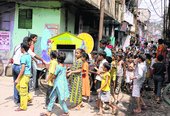 |
| Slum children rush to watch a telecast of Gali Gali Sim Sim. |
Nine-year-old Mohammad Azaruddin from Tangra knows how to keep his para clean. “There should be dustbins in the locality and garbage should only be dumped there,” he explains. His friend Mohammad Faiyaz chimes in: “Dogs should also be bathed and cleaned, as shown on TV.” Little Shabiha Parveen adds: “We must also try to beautify our galli.”
The trio are part of a group of youngsters who would gather five days a week from April to September to watch episodes of the children’s television series Gali Gali Sim Sim, screened from a mobile television in their area. As the signature tune of the series falls from their lips, it is evident that the youngsters have imbibed valuable lessons in hygiene from the show.
The drive was part of the Mobile Community Viewing Initiative (MCV) conducted by non-profit organisation Sesame Workshop India (SWI) in the slum areas of Belgachhia, Rajabazar, Tangra, Topsia, and Ekbalpore.
Gali Gali Sim Sim is the desi version of Sesame Street, said to be the pioneer in educational television, with its endearing Muppet characters, including Elmo, Bert and Ernie. The Indian version, too, is a mix of live action, animation and puppets.
“With Gali Gali, we targeted the slum populace where early childhood education is abysmally low,” says Priyanka Zutshi, the programme manager of SWI. Numbers, hygiene and good behaviour are some of the subjects that the children were taught. “Although poor, a large section of the population has access to television. Of these, our target age group was three to six years,” says Zutshi.
The show is telecast on Cartoon Network, POGO and Doordarshan. The focus of the original show changes depending on the country. “While in Egypt, the show focuses on the education of the girl child, in India, the thrust is on cultural diversity and tolerance and how to shed colour barriers,” explains Sashwati Banerjee, the executive director of SWI. It is currently telecast in 120 countries.
In Calcutta, Banglanatak.com was roped in to help with the initiative. It identified slum areas and did theatre workshops with kids in the locality to reinforce the content of the show. “After each show, we organised a workshop on theatre-based communication and games to teach them about group coordination, cleanliness and shapes. We also taught them mask-making to develop their imagination,” says Amitava Bhattacharya, the director of Banglanatak.com.
The screenings were organised in two phases. In Phase I, the shows were screened simultaneously in selected areas for five days a week and in Phase II, the programme was re-telecast for the same section after a gap of a few days, to increase the impact.
Jhinuk Mazumdar
Chit Chat
Milton revisited
The English department of Basanti Devi College organised an inter-college seminar titled “Milton and Miltonic Studies” on October 1. This was part of a continuing programme commemorating the 400th birth anniversary of the 17th century poet. The seminar was chaired by professor Shanta Mahalanobis.
Some of the participating colleges were Loreto, Lady Brabourne, South Calcutta Girls’ and Women’s Christian College. Professors Amlan Dasgupta and Malabika Sarkar of Jadavpur University were invited to deliver special lectures on Milton on November 12.
Piyali Saha,
Basanti Devi College
To school after school
A project was launched at the St James’ School auditorium by NGO CINI Asha, in association with The Telegraph in Schools, where school students will teach their less-privileged counterparts. Funded by the NGO Save the Children-Bal Raksha Bharat, its motto is “each one, teach one”. “This project was inspired by the Child Domestic Programme of Loreto Day School, Sealdah. At least 20 volunteers will be needed from each of the participating schools to teach 200 street children,’’ said Carolyn Winget of Save the Children. Students from Loreto Day School, Sealdah, and St James’ School will teach the children after school hours.
Somrita Ganguly
Loreto College
Tales of adventure
Mountaineering club Nature Oriented Venturous Association (Nova), organised a graduation ceremony for its rock climbers recently. Every year, Nova introduces a new band of youngsters to rock-climbing at the Bansa Hills in Purulia. It completed its ninth rock-climbing course and seventh nature study camp this year. The programme started with the lighting of a lamp by mountaineer Bhanu Banerjee, who had accompanied Sir Edmund Hillary on his 1961-62 expedition. At the nature study camp, trainees are taught how to survive in the open with the bare minimum. “We fashioned plastic sheets into makeshift shelters. We were also taught how to cook meals with firewood,” said this year’s trainee Charubak Chakrabarty.
Chandreyee Bhaumik
St Xavier’s College











